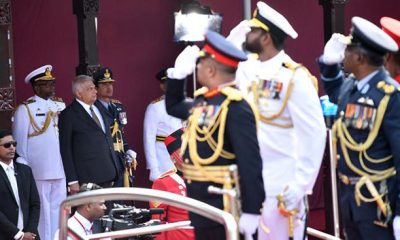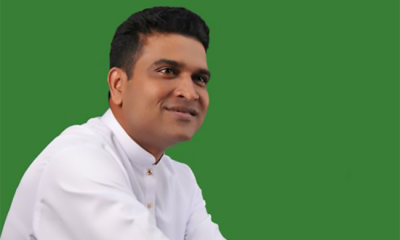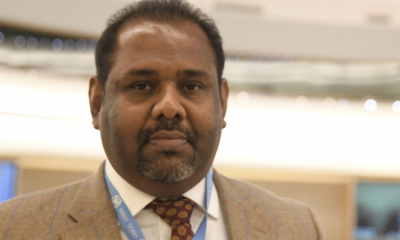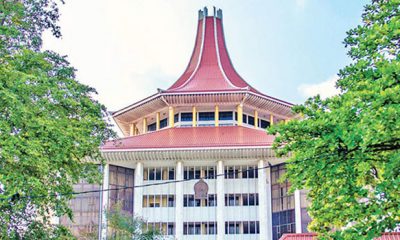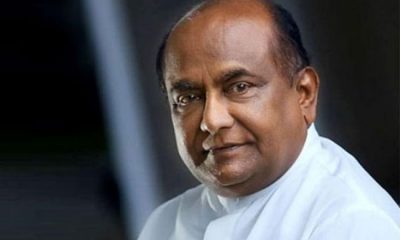Editorial
Arrests and duplicity

Friday 9th June, 2023
Speaker Mahinda Yapa Abeywardana finds himself in an unenviable position over the arrest of All Ceylon Tamil Congress leader and MP Gajendrakumar Ponnambalam, who was granted bail after being produced before the Kilinochchi Magistrate’s Court, on Wednesday. He is under fire from the Opposition, which says he did precious little to prevent Ponnambalam’s arrest, but the government MPs have endorsed police action. Opposition Leader Sajith Premadasa has said he does not approve of what MP Ponnambalam is alleged to have done, but the latter should not have been arrested on his way to Parliament. He thinks there has been a breach of parliamentary privileges.
Speaker Abeywardana insists that he is without power or authority to prevent the police from making arrests. The question is whether the police would have been allowed to arrest a government MP for berating the police, or whether any action would have been taken against Ponnambalam if he had been supportive of the ruling coalition. When MP Ali Sabri Raheem, who has crossed over to the government, was recently nabbed by the Customs at the BIA, with 3.5 kilos of gold and nearly 100 smartphones, he was allowed to walk free after paying a fine amounting to only 10 percent of the value of the contraband goods, which were confiscated. Pointing out that a smuggler without political connections would have been made to pay a fine equal to the total value of the illicit goods taken into custody, the Opposition has asked why no action was taken against MP Raheem for violating the exchange control laws.
In a widely-circulated video, MP Ponnambalam is seen launching into a tirade against a group of policemen, one of whom pays him back in his own coin, in Vadamarachchi, recently. According to media reports, the incident took place near a GCE O/L examination centre; did it disturb the students sitting the exam, and if so, action should be taken against all those responsible for the commotion. Such behaviour is unbecoming to the so-called lawmakers and law-enforcement officers.
The Vadamarachchi incident would not have developed into a mega issue if MP Ponnambalam had made a statement to the police when he was asked to do so. In fact, there would have been no issue at all if he had refrained from confronting the police personnel, allegedly obstructing them in the process; the situation, we believe, could have been handled wisely. The matter, which is now before a Magistrate, is best left to the learned judge. We only discuss some political aspects thereof.
We usually do not have a kind word to say about the police, but they should be treated with respect, and must not be obstructed while on duty. All politicians, save a few, ride roughshod over the police albeit to varying degrees, but angry reactions from the latter are extremely rare. Will the police stand up to the unruly government MPs as well?
All MPs must be treated equally. What MP Ponnambalam is alleged to have done in Vadamarachchi pales into insignificance in comparison to charges against State Minister Diana Gamage; the CID did not arrest her even though the Colombo Chief Magistrate held that the police could take her into custody without a warrant. What made the police baulk at arresting her? Is it that the government thinks all MPs are equal before the law but the members of its parliamentary group are ‘more equal than’ others?
As for the clashes between the MPs and the police, one may recall that in late 2018, the Rajapakasa loyalists in the UPFA parliamentary group went berserk in Parliament in a bid to prevent the UNP and its allies including the JVP and the TNA from toppling the 52-day government, hurriedly formed by the then President Maithripala Sirisena and former President Mahinda Rajapaksa, in a questionable manner.
They turned violent in the House, and even lunged menacingly at Speaker Karu Jayasuriya, who had to be escorted to safety. They then damaged furniture and microphones in the House and threw chairs at the policemen protecting the beleaguered Speaker. It is a non-bailable offence to damage public property. But no cases were filed against those violent MPs.
What’s the world coming to when the MPs who throw projectiles at the police inside Parliament itself and smash up public property are let off the hook but legal action is taken against an MP for hurling verbal abuse against some police personnel and allegedly obstructing them? The government has made a mockery of its ‘one-country-one-law’ slogan, which it makes out to be its guiding principle. The aforesaid instances of duplicity make one wonder whether that catchphrase should be changed to ‘one-country-two-laws’.
Editorial
Ensure safety of COPF Chairman

Saturday 8th June, 2024
It was with shock and dismay that we received the news about death threats to COPF (Committee on Public Finance) Chairman Dr. Harsha de Silva over the ongoing parliamentary probe into the on-arrival visa scam. Dr. de Silva yesterday told Speaker Mahinda Yapa Abeywardena, in Parliament, that he was facing death threats and intimidation, and it was incumbent upon Parliament to ensure his safety. He stopped short of naming names, but revealed that some ruling party MPs were among those who had ganged up against him. The Speaker only said there had been no complaint, and he would look into the matter.
The SLPP-UNP government has been doing everything in its power to have all parliamentary committees under its thumb. The COPE (Committee on Public Enterprises), which once helped restore public faith in the legislature by exposing state sector corruption, has now become a mere appendage of the incumbent regime, thanks to the appointment of SLPP MP Rohitha Abeygunawardena as its Chairman. The SLPP-UNP combine also tried to oust COPF Chairman Dr. de Silva, but in vain. However, it knows more than one way to shoe a horse.
The COPF, under Dr. de Silva’s chairmanship, has been a thorn in the side of the government, which is struggling to cover up numerous corrupt deals. Dr. de Silva yesterday told Parliament that he found it extremely difficult to function as the COPF head due to severe resource constraints his committee was facing; he himself had to pay the salaries of some of his staff members besides burning the midnight oil.
The sheer workload he had to cope with as the COPF chief had taken its toll on his health, he said, informing the Speaker that he was at the end of his tether, and at times thought of resigning from the COPF. This is exactly what the government wants him to do; resource squeezes and threats are aimed at making him quit.
On 26 May, Dr. de Silva revealed, in an ‘X’ post, that the COPF had uncovered some vital information about the visa scam and it would reveal everything after its final meeting on the issue; the COPF was committed to exposing the truth behind the controversial tender, he added. In an editorial comment on 27 May, we warned him.
While thanking him for his bold stand, we pointed out that by making such a statement, he had thrown caution to the wind, and become a marked target, with the government making an all-out effort to delay the COPF investigation lest the truth should come out much to the detriment of its interests in this election year. Unfortunately, what was feared has come about; Dr. de Silva is complaining of death threats and government moves to strangulate the COPF financially to derail its investigations.
Dr. de Silva’s predicament exemplifies the fate that befalls the few good men and women in Parliament. It is hoped that all those who seek an end to the state sector corruption will rally behind Dr. de Silva, and bring pressure to bear on the government to ensure his safety. Let Dr. de Silva be urged to reveal the names of those who have issued threats, veiled or otherwise, to him and are trying to scuttle the COPF probes.
Editorial
Dead man walking!

Friday 7th June, 2024
The SLPP-UNP government is going hell for leather to make bad laws as if there were no tomorrow. It is abusing its parliamentary majority, which has been retained with the help of some crossovers, for that purpose. The Opposition, the media and trade unions are up in arms, and understandably so. The incumbent regime is a dead man walking; it is so desperate that it is capable of anything. Hence the need for it to be restrained.
The Electricity (Amendment) Bill (EAB) plunged Parliament into turmoil yesterday, but the government secured its passage. The Supreme Court (SC) determined the entire EAB inconsistent with the Constitution and recommended changes thereto. After unveiling the Bill, sometime ago, Minister of Power and Energy Kanchana Wijesekera hailed it as an excellent piece of legislation aimed at straightening up the power sector to serve the public interest better.
The SC determination left him with egg on his face. He reminded us of the proverbial curate who, while eating a stale egg, assured his host, a Bishop, that parts of it were excellent. Wijesekera’s egg, as it were, made Parliament stink yesterday, but he sought to please his masters by praising it as a silver bullet.
EAB should have been discarded and a new one drafted in consultation with all stakeholders. But the government is apparently driven by an ulterior motive; its aim is not to serve Sri Lanka’s interests but to look after those of some moneybags.
It is not uncommon for Bills to contain some flaws, which are rectified either before or during the committee stage. But there is something terribly wrong with draft Bills that are full of sections inconsistent with the Constitution. The drafters of EAB have demonstrated their sheer ignorance of the supreme law, and that they are not equal to the task of drafting Bills. If they had read the Constitution at least perfunctorily, they would not have drafted such a bad law.
Ignorant and incompetent, they do not deserve to be paid with public funds and must be sent back to law school. They must be summoned before Parliament and questioned on their serious lapses, which have caused public faith in the national legislature to diminish.
Curiously, the MPs who demand that judges, doctors, Central Bankers, and other public officials be summoned before Parliament have taken badly drafted Bills for granted. The power sector trade unions yesterday alleged that EAB was of Indian origin and geared towards furthering the interests of Adani Group at the expense of Sri Lanka.
Most critics of EAB are agreeable in principle to the need for power sector reforms; the Ceylon Electricity Board should be given a radical shake-up, and transformed into a modern organisation capable of providing a better service at a lower cost. They only asked the government to tread cautiously, consulting all stakeholders and taking action to ensure that the country’s interests prevailed over everything else. But the government was in a mighty hurry to steamroller the Bill through Parliament, making the Opposition ask whether it was doing so at the behest of some external forces involved in controversial power generation deals here.
What is passed by the current Parliament can be either amended or abolished by a future parliament in a constitutionally prescribed manner. But that does not mean that a government is free to pass bad laws, making the country enter into long-term agreements with powerful nations and their investors. It looks as if the SLPP-UNP regime did not care two hoots about the consequences of its actions.
Editorial
Modi Magic on the wane

Thursday 6th June, 2024
The outcome of India’s parliamentary election (2024) has led to a ‘perspective ambiguity’. Prime Minister Narendra Modi lost no time in declaring victory for the BJP-led NDA alliance, which secured 293 seats in the 543-member Parliament, but he must be a worried man. The BJP is short of 32 seats to form a government under its own steam; it has lost 63 seats or about 20% of its parliamentary strength. It had 303 seats in the previous Parliament, and that number has dropped to 240.
Modi has become the second Indian Prime Minister to win a third term. The first PM to do so was Jawaharlal Nehru. But Nehru won an outright majority in Parliament in 1962; Modi has had to depend on smaller parties in his alliance to retain his hold on power. Modi must be reeling from a sharp drop in his victory margin in his own constituency, Varanasi; it has decreased to 152,000 from 480,000 in 2019 whereas Modi’s bete noire, Rahul Gandhi, won Raebareli by a staggering 390,000 votes.
Modi, who reigned supreme with 303 seats in the previous Parliament, is now dependent on parties such as Nitish Kumar’s JD-U and Chandrababu Naidu’s TDP to form a government. He has had to lead an alliance of strange bedfellows. Both Kumar and Naidu were bitter critics of Modi. Kumar helped form the oppositional alliance, the INDIA bloc, before switching his allegiance to PM Modi. Naidu also closed ranks with the BJP in the run-up to the election. These politicians have been described as extremely ambitious and highly unpredictable, and whether Modi will be able to manage them and consolidate his grip on the NDA alliance remains to be seen. They will demand plum ministerial posts in return for their support. The TDP is said to be eyeing Transport and Health portfolios! That is the name of the game in coalition politics, where it is not uncommon for the tail to wag the dog, so to speak. These two political leaders are however not the only problem Modi will have to contend with. The next five years will feel like an eternity for PM Modi.
Nothing would have been more shocking for the BJP than its defeat in Uttar Pradesh’s Faizabad constituency, where the Ram Mandir has been built. Modi may have thought he would be able to win the Lok Sabha election hands down after the consecration of that temple, which became a centrepiece of the BJP’s election campaign. The BJP lost that seat to the Samajwadi Party! Modi must be disappointed that the Ram Mandir hype failed to trigger a massive wave of support for his party. This particular defeat signifies a massive setback for the BJP’s ethno-religious agenda.
Modi’s divisive election campaign failed to yield the desired result. The BJP’s failure to secure an outright majority could be attributed to a host of factors, some of them being the suppression of the Opposition, the arrogance of power, chronic unemployment, and the rising cost of living. The BJP also did not care to reimage itself in a positive light to attract the youth.
Modi will hereafter see the Congress-led INDIA bloc with 223 seats, in his rearview mirror. The Congress (99 seats) and its allies have eaten into the BJP support base considerably, but they have a long way to go before being able to capture power.
The bumpy ride ahead for the BJP-led coalition government to be formed may improve the INDIA bloc’s chances of bettering their electoral performance and turning the tables on the BJP and its allies in time to come. Modi will have a lot to worry about in his third term.


